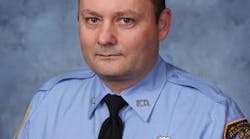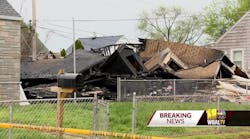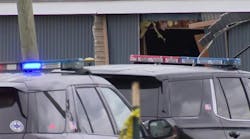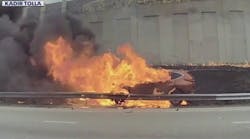Dec. 10--Greater consideration should have been given to hot weather during a training program in which a volunteer Atascocita firefighter died in 2012, according to a report issued Monday by the State Fire Marshal's Office.
The report did not directly blame organizers of the Smoke Divers advanced survival program, an annual event in Beaumont that trains firefighters how to cope with complicated, life-threatening scenarios during a fire. However, it did make a number of recommendations for preventing future incidents, including one that might have saved the life of 46-year-old Neal Wade Smith, a captain and five-year veteran with the Atascocita Volunteer Fire Department.
The report says a cold-water bath might have lowered Smith's internal body temperature quickly enough to prevent the brain swelling that caused his death following severe hyperthermia.
Cooling treatments
"Paramedics at the scene of the training facility used cooling treatments other than cold or ice water immersion to try to cool Captain Smith, including applying ice packs to the neck and groin, starting IV fluids, and administering oxygen," the report states. "But if the training facility had cold or ice water immersion available, the captain's core temperature could have been reduced sooner, improving his prognosis."
State investigators concluded that the training course, which took place on Sept. 15 and 16, 2012, did not follow procedures and standards established by professional organizations, especially in areas of risk management, safety, and the "rehabilitation" of those who have gone through physically demanding exercises.
They said Smith's death, along with the hospitalization of another participant and the problems encountered by others, is a clear sign that the program's "current heat stress program is inadequate."
The so-called smoke divers course is billed as an advanced training program and is offered in a number of states. Following Smith's death, the sponsoring East Texas Fireman's and Fire Marshal's Association decided to cancel the 2013 session as it awaited recommendations from state officials "that will increase the safety of future Smoke Diver students," according to a statement posted on a website used for course signup.
The Chronicle was unable to reach organizers of the training course for comment.
Although temperatures were not extreme on the weekend of Smith's death, falling below the criterion used by the armed services and the American College of Sports Medicine as the basis for suspending outdoor activities, organizers failed to appreciate the effect of the firefighters' heavy gear and intense activity, the report said. Doing so would have placed it above the heat threshold.
Better monitoring?
The report also stressed that such training programs need a better way of monitoring the individuals going through the training exercises. It said specialists familiar with emergency medicine better understand how to spot individuals showing signs of excessive heat-related stress, but that constant monitoring was not provided at the course, either during the specific exercises or cooling-off periods afterward.
"Although paramedics and emergency medical technicians were available on the training site, they did not medically monitor the students during the training or rehabilitation periods," the report said.
Organizers of the course, which they bill as the only "true smoke diver school in Texas," have previously said they were shocked by Smith's death, pointing out that temperatures were in the 80s and that no live fire or smoke was used during the exercises.
The fire marshal's office recommended holding the training course during cooler months.
Copyright 2013 - Houston Chronicle






